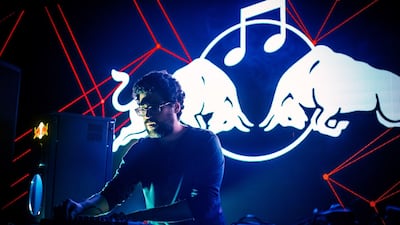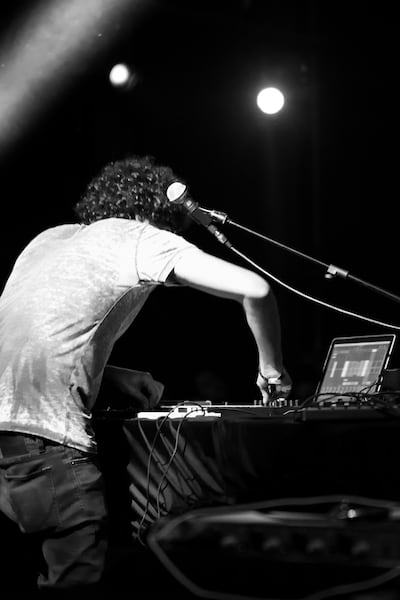He may have 10 years of music production under his belt, but Lebanese composer Etyen had first-day nerves when he scored his first television series, Jinn.
The five-part supernatural drama set in Amman follows a group of teenagers dealing with the fallout from one ill-fated night spent near the ancient city of Petra. It is also the first original Arabic Netflix series.
“I come from a very musical family … my dad used to play in a band when he was young so I was always bound to play an instrument,” says the 29-year-old artist, who was born Samer Etienne Chami.
As a teenager in the 2000s in Beirut, he was also exposed to some of the city’s first alternative bands such as Soap Kills, Scrambled Eggs and New Government, whose early performances and work ethic inspired him to pursue music. By 15, he was playing with friends and writing songs in his spare time.
Etyen began experimenting with music production and recording in 2009, when he downloaded an early version of the music-creation software Cubase and received a number of hand-me-down synthesizers from his uncle. His drummer friend also owned a sound mixer, and so a mini-recording studio was created. From the comfort of their living rooms, they began to write and record. Chami started releasing music under the Etyen moniker four years later, with his track A Midnight Drive.
It was in July of last year that he was approached, as one of several potential candidates, to work on Jinn. Etyen submitted a number of tracks to the producers and soon after was hired and sent his first scene to score. "It was a thriller horror moment in episode one," he says.
He zeroed in on a sound that would act as reference point for many of the show’s more harrowing moments.
“I scored it … and I had no idea if it was the right thing or whatever, but it felt right and I sent it,” says Etyen.
Jinn's music supervisor, Lynn Fainchtein, who also worked on Birdman, Roma and The Revenant, loved the take, he says. "I never changed the way that I scored that scene."
From then on, Etyen would receive footage, score it, send it back and adjust his compositions based on the production team's ongoing edits.
“That was the most fatiguing,” he says of the back-and-forth method, as any change to the footage meant a change to the pre-existing score.
The process involved composing pieces that aligned with characters, overarching themes and ongoing events to help establish, as he describes it, “coherent musical journeys in each episode”.
He explains how the music must mirror the story as it unfolds on screen. It comes down to determining what needs to be communicated and when, according to Etyen. “At the end I was still kind of myself … I was still following my feelings a lot of the time.”
Despite the positive feedback, it wasn't an easy ride for the musician, who admits he had some reservations heading into production.
"I was really nervous, because it was my first time making music for a TV series," he says. "I have done a lot of music for TV ads and I have done music for film but not in the capacity of a full-on show."
However, Eyten found the project ignited a newfound passion for scoring for the small and big screens.
"I can’t wait to score more stuff, because it's super inspiring and it’s a whole different shift in how you have to think about making music," he says. "It has nothing to do with how you make music normally, even though I used to make stuff that was very cinematic."
Broken trombones and thinking in the moment
Etyen has also released a number of singles, remixes and four EPs: 2014's Happy New Year, 2016's Out of Love, 2018's Elephantasm and Bebe, released this March.
The latter is a three-track EP, with the songs composed entirely of acoustic samples, an approach borne of his growing discontent with the repetition in earlier works such as Out of Love.
“I was kind of tired of all the processing involved and all the synthesis and whatever because I did a lot of that in the EPs that came before,” says Etyen.
One of the tracks, Elephant in the Room, was inspired by David Lang's Symphony for a Broken Orchestra. The Grammy Award-winner composed the piece to be played on 1,000 broken instruments collected from various Philadelphia public schools. Elephant in the Room samples from broken instruments in a similar manner and Lang's own recordings.
“Even the kick [drum], the hi-hats, everything in it is an acoustic sample of an instrument that has been [messed] with to the point of no return,” he says.
The music video was shot on a four-day visit to Sweden, and documents a romp through various terrains punctuated by intermittent posing, dancing and leapfrogging.
“Me and my friend who is in that video, that’s how our relationship is," he says. "We are like little kids when we are together; we will like jump around everywhere, we’ll go crazy, so it was super special for me to get to go there and film it with her."
That energy translates into the video, and is mirrored in Bebe as a whole. "It's kind of describing that childlike behaviour of just being excited about what you are doing without really thinking further than the moment itself."


